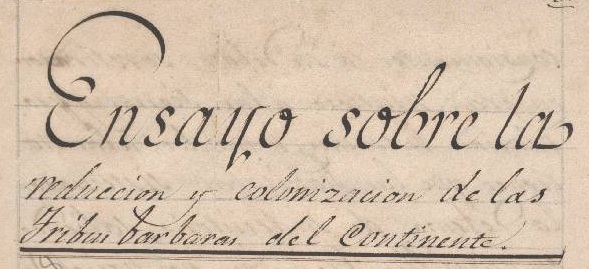| << Chapter < Page | Chapter >> Page > |
This module offers suggestions for educators teaching units on colonial beginnings in Spanish America. The module’s themes include religion and politics in the Americas. Francisco Frejes "Essay on the Conversion and Colonization of the Continent’s Barbaric Tribes" is a document in the 'Our Americas' Archive Partnership that provides a historical account of this colonization process. Written during the nineteenth century, this document provides a helpful way to introduce students to missions and the history of Spanish Catholicism in North America.
An educator might begin by asking students about the function of a religious mission. In Missions and the Frontiers of Spanish America, Robert Jackson provides a basic overview. As he tells us, missions were also called doctrinas, reducciόnes, and misiones. The purpose of the mission was to indoctrinate natives in the official religion of the new Spanish regime, and prepare them for their role in the new colonial order (Jackson 23). Missionaries constructed new communities and built mission centers in pre-existing communities. By converting natives to Spanish Catholicism and creating a community where natives could learn new crafts and agricultural skills, missionaries supported both the Roman Catholic Church and the Spanish government (Jackson 22-3).
“essay on the conversion and colonization of the continent’s barbaric tribes (1820-1840)”

Beyond this basic definition, teachers can introduce a discussion on the more particular aspects of mission life. Spanish colonials established Catholic missions as both religious and colonial institutions. Using Francisco Frejes’s history, teachers can ask students to find sections and specific terms that show how religious conversion and Spanish colonization worked together. As students will find, Frejes’s history presents religion as an essential component of colonization. For instance, Frejes wrote:
It is not strange in the history of nations that, in order to create the common happiness of society, some particular rights must be suspended, with respect to those whose moral constitution can obstruct the general well being. From all this, one must infer: that the colonization laws dictated through these territories should, as a principle basis, restrict the Indians’ absolute liberty as much as necessary to receive the religion and politics upon which all society is founded. Religion admirably balances all the interests of the world, beginning with individual ones until being able to establish peace and happiness in the entire universe; the same would occur if all the nations participated in its luminous dogmas and precepts. (5b-6b)
Teachers could ask students to examine a passage like the one above, and ask questions about how religion functions as a component of colonization. According to Frejes, how did religion serve colonization? What type of language is used to describe the relationship between religion and colonization? Taking one passage and discussing the type of rhetoric used can help students to consider and evaluate the purposes and reasons behind imperialism. Teachers can also discuss how historians have recorded the history of imperialism: What type of story does Frejes tell? How does he tell it? How do we see history working within his understanding of “conversion and colonization”?

Notification Switch
Would you like to follow the 'Catholic missions and spanish colonialism' conversation and receive update notifications?